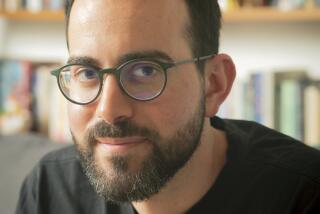The Last of the Mohicans
- Share via
Pole your punt a quarter-mile up the Cherwell from Magdalen College, Oxford, and take a right fork. The left fork leads to Parson’s Pleasure, a private bathing spot for the “dons”: lecturers, tutors, deans and heads of colleges who between them care for the college finances and the students’ minds and morals. One day, a boatload of young women took the wrong fork, to the consternation of sunbathers. Leaping up, all but one wrapped towels around their loins: the warden of Wadham alone put a towel over his head. “In these parts,” he explained, “It’s by my face that I’m known.”
Maurice Bowra, then warden of Wadham College, Oxford, is a leading figure in this report on the special features of Oxford and Cambridge education since the 1830s. Maurice was eccentric, even by Oxford standards: Most of my colleagues when I taught there had their own Bowra stories, and Noel Annan--a former head of King’s College, Cambridge, and the University of London, who died earlier this year--has left us an entertainingly persuasive account of the virtues and oddities of the formation professionelle that has shaped the English ruling class for a century and more.
Not that the “Oxbridge” system has yet lost this distinctiveness. Among any country’s institutions, academic ones are often the most conservative, and in the European Union they will probably be the last to be “harmonized.” No one will hurry to impose a single pattern on the French hautes ecoles and the German seminarium system, let alone on the unbiddable English: At most, the European Commission in Brussels serves higher education as one more agency to fund research and graduate study. Meanwhile, the different methods of higher education in the nation states remain sacrosanct.
How much of 19th century upper-middle-class life and self-esteem was built into the two prestige Oxbridge universities! Again and again, between the 1830s and the 1960s, their ideas and values were transformed: most strikingly after the civil service reforms of the 1850s, which created a market for Benjamin Jowett’s new curriculum in philosophy and ancient history at Oxford, still known as greats.
But the underlying strategy remained the same. It took control of England’s affairs out of the hands of the hunting gentry and place-seekers and gave it over to the intellectually trained men and, more recently, women whom Annan saw as the English “intellectual aristocracy.” (This is one of the subtexts of the TV series, “Yes, Minister.”)
Some of the most fascinating things in this book are, in fact, the genealogical charts in the final essay. Evangelicals and Quakers, bankers and merchants, Wedgwoods and Trevelyans: A couple of dozen families repeatedly intersect. As Annan’s penultimate paragraph puts it: “If we recollect that [the novelist] E.M. Forster was a great-grandson of Henry Thornton and that [the painter] Duncan Grant was a cousin of Lytton Strachey, all the members of the original Bloomsbury circle except Sydney Saxon-Turner and H.T.J. Norton have already appeared in the families we have examined; and so have the first five principals of Newnham [College, Cambridge] and nine out of the ten masters of Trinity [College, Cambridge] in the twentieth century.”
An outsider will be tempted to suspect nepotism, falling for an oversimplified reading of something much more interesting: viz., the seductiveness of intellectual brilliance. Annan’s sympathetic account of the personally and professionally frustrated life of the classicist Jane Harrison, who entered Newnham in the 1890s, is a fine case study.
A historical narrative of the development of this intellectual aristocracy sums up the social and scientific thought of 19th and 20th century England. The principal absentees are Jeremy Bentham and the two Mills, James and his more famous son, John Stuart. Utilitarianism and agnosticism were not admitted to Oxbridge till much later, and the success of University College London in the natural and social sciences is a sign of their continuing influence. (Here, too, eccentricity plays its part: founded by Jeremy Bentham, the college preserves the mummified Bentham as a totem and tourist attraction.)
Confining himself to Oxford and Cambridge, Annan begins with the paleontologist William Buckland and the theologian John Henry Newman, who between them set the accepted limits of speculation from 1820 to 1850. Looking back, we may be struck more by Newman’s oddness than by his charisma--a depreciating asset--but the scientifically minded Buckland was just as strange:
He had a Protestant’s skepticism of Catholic miracles. Pausing before a dark stain on the flagstones of an Italian cathedral where the martyr’s blood miraculously renewed itself, he dropped to his knees and licked it. “I can tell you what it is: it is bat’s urine.”
With a charming mixture of analyses and anecdotes, Annan builds up a picture of the changing Oxbridge scene that keeps a reader’s imagination, not least for its un-American features. Being myself a Cambridge product, I do not easily adapt to American styles of university teaching. Students (I believe) do best to read whole books, not just 15 or 20 pages pre-selected by the instructor, and they can usefully be left to find out for themselves which books are worth reading at all. Why are they not challenged to prepare for examinations that show what they have made of themselves in three or four years, rather than being graded piecemeal, one packaged course at a time? Oxbridge at least teaches them that the obstacles we meet in real life arise in situations that need managing: They are not “problems” to be “solved” in a uniquely correct way shown at the back of the book. No wonder cricket matches can last for five strategically evolving days, while baseball games are over in a couple of hours.
For all his Cambridge background, Annan was something of an Oxford man: It is no accident that he gives his longest chapter--on “The Don as Wit”--to Bowra. Though quite clear to insiders, the difference between the two universities is as hard to define as that between Harvard and Yale. One helpful epigram goes, “Oxford men act as if the world belonged to them: Cambridge men don’t care who it belongs to.” From Isaac Newton to Charles Darwin and on to Maurice Crick, Cambridge has excelled in the natural sciences, Oxford in more worldly fields. At Cambridge, Annan is entranced by Frederic Maitland, a late-19th century legal historian, but the basic sciences, and academic philosophy even more, land him in difficulties. His book is at its weakest when it sets out to explain--none too successfully--the issues dividing Hume from Kant, or the ideas that J.J. Thompson and Ernest Rutherford brought to physics. What sets his narrative alight is, rather, the character of the most engaging and attractive teachers: at Oxford a Newman, a Bowra or an Isaiah Berlin; at Cambridge an Oscar Browning, a J.T. Sheppard or a Dadie Rylands.
*
One doubt Annan’s book raises has to do with the close friendship he sees between Berlin and Bowra. In a community of monologists, the two were friendly rivals: Any attempt at a conversation between them was a marvel to behold. (“Which will stop talking first?”) Yet their styles were oil and water. Haunted by the Nazi and Soviet years, Berlin was always responsive to the tragedy of 20th century Europe, but Bowra could strike one as brittle, as Bloomsbury did to Wittgenstein, and Michael Ignatieff’s fine recent biography of Berlin does not even mention him.
Despite his claims for the wider influence of Oxbridge, then, Annan’s concerns are mainly local. Bloomsbury was intellectually a Cambridge colony: Behind John Maynard Keynes there lay Bertrand Russell and G.E. Moore. Yet these figures get surprisingly little discussion, compared with the social circles within King’s and Trinity; and, as a Kingsman, I must say that, from the 1940s to the ‘60s, life there was more political and less overtly gay than this account suggests.
Read as social history, then, “The Dons” is less distinguished than Annan’s books on Virginia Woolf’s father, Leslie Stephen, and on the broader English 20th century scene. But the comical-satirical narrative of which he was a master is a joy to read, and “The Dons” will deservedly be enjoyed as a bedside book by those who treasure English eccentricity. As such, it is a fine successor to Winstanley’s classic books on Unreformed Cambridge, and those who put “The Dons” down asking for more can turn to Winstanley for a sequel, or what Hollywood now calls a “prequel.” Annan is here at his best when giving us the very highest-grade gossip, though one wonders how he can praise John Sparrow as a warden of All Souls after the tales he has told us about how Sparrow lobbied for the wardenship, and what he did, or failed to do, with it after election.
Still, if one puts “The Dons” down thinking, not “How profound!” but “What fun!” there is no harm in that. The significance of Oxbridge higher education for the social, cultural and political history of England since 1830 is beyond question, and Annan helps us to understand its importance. But in the end it is the personal stories we remember.
Among the English, eccentricity has long been a valued trait, and it is most typical when least remarked on. Donald Mackinnon, the philosophy tutor at Keble College (who makes a fleeting appearance on page 211), had some odd habits. When lecturing, he would turn a naked razor blade over and over in his hand, and the students gazed in fear that his blood would flow. One student came for his weekly one-on-one tutorial only to find the room empty. After he had waited 40 minutes, Donald burst out of the closet, crying, “Ah ha! You thought I wasn’t here!” But these Mackinnon stories were unwittingly capped by his wife Lois, who, at a tea for her fellow don’s wives, was heard to remark, “What a pity it is there aren’t any eccentrics left in Oxford, as there used to be!”
More to Read
Sign up for Essential California
The most important California stories and recommendations in your inbox every morning.
You may occasionally receive promotional content from the Los Angeles Times.













